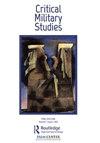Visualizing liminal military landscape: a small scale study of Armed Forces Day in the United Kingdom
Q1 Arts and Humanities
引用次数: 3
Abstract
ABSTRACT Armed Forces Day is a military-centric event in the UK introduced into the public calendar during 2009 following recommendations made from The Report of Inquiry into National Recognition of Our Armed Forces. Despite the significance of these events requiring the situating and performance of military values, personnel, equipment and activities within otherwise civic spaces, academic research and critical commentary into the implementation and development of Armed Forces Day is limited. Influenced by autoethnographic work from critical human geography focussing on the materiality, spatiality and embodied experiences of military airshows, and seeking to extend some insights from the original text Military Geographies, the aim of this paper is to observe the situatedness and performance of Armed Forces Day to be what is defined herein as ‘liminal military landscape’. Through conducting a small-scale study of Armed Forces Day 2017 in Liverpool, employing observational techniques including notetaking and documentary photography, during this event urban space was found to undergo spatial ‘transitions’; have ‘portals’ opened through which temporality and materiality invoked past experience into the present; and create newly established liminal ‘thresholds’ waiting to be crossed between the seemingly contiguous spaces of civic and military.边缘军事景观的可视化:英国武装部队日的小规模研究
武装部队日是英国的一个以军事为中心的活动,根据国家承认我们武装部队的调查报告的建议,于2009年被引入公共日历。尽管这些活动具有重要意义,需要在其他公民空间中放置和表现军事价值、人员、设备和活动,但对武装部队日的实施和发展进行的学术研究和批判性评论有限。受批判性人文地理学关注军事航展的物质性、空间性和具体化体验的自我民族志工作的影响,并寻求从原始文本《军事地理》中扩展一些见解,本文的目的是观察武装部兵节的情境性和表现,即本文所定义的“阈限军事景观”。通过在利物浦进行2017年武装部队日的小规模研究,采用包括笔记和纪实摄影在内的观察技术,在此活动期间,城市空间经历了空间“过渡”;打开“门户”,时间性和物质性通过它将过去的经验调用到现在;并在看似相邻的民用和军事空间之间创建新建立的阈限“门槛”等待跨越。
本文章由计算机程序翻译,如有差异,请以英文原文为准。
求助全文
约1分钟内获得全文
求助全文
来源期刊

Critical Military Studies
Arts and Humanities-History
CiteScore
1.90
自引率
0.00%
发文量
20
期刊介绍:
Critical Military Studies provides a rigorous, innovative platform for interdisciplinary debate on the operation of military power. It encourages the interrogation and destabilization of often taken-for-granted categories related to the military, militarism and militarization. It especially welcomes original thinking on contradictions and tensions central to the ways in which military institutions and military power work, how such tensions are reproduced within different societies and geopolitical arenas, and within and beyond academic discourse. Contributions on experiences of militarization among groups and individuals, and in hitherto underexplored, perhaps even seemingly ‘non-military’ settings are also encouraged. All submitted manuscripts are subject to initial appraisal by the Editor, and, if found suitable for further consideration, to double-blind peer review by independent, anonymous expert referees. The Journal also includes a non-peer reviewed section, Encounters, showcasing multidisciplinary forms of critique such as film and photography, and engaging with policy debates and activism.
 求助内容:
求助内容: 应助结果提醒方式:
应助结果提醒方式:


